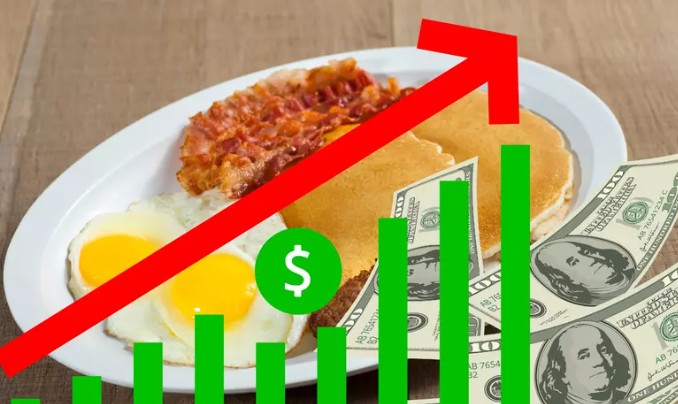The Price of a Peaceful Morning
For many Americans, mornings are more than just a time of day they’re a ritual. Whether it’s the quiet hum of a coffee maker, the sizzle of bacon in a pan, or the comfort of a warm bowl of oatmeal, breakfast is the anchor that sets the tone for everything that follows. It’s personal, habitual, and often deeply nostalgic. But in 2025, that simple pleasure has become noticeably more expensive and not just because of inflation. A new wave of tariffs, introduced by President Trump in April 2025, has quietly infiltrated the grocery store and hit breakfast harder than any other meal.
These tariffs include a universal 10% duty on all imported goods, with additional “reciprocal” tariffs targeting specific countries 34% on China, 24% on Japan, 46% on Vietnam, and 20% on the European Union. While the political aim is to protect American industries and rebalance trade relationships, the everyday consequence is that your morning meal often built on imported staples is now a casualty of global economic strategy.
Why Breakfast Is Bearing the Brunt
Import Dependency Is Sky-High for Morning Staples
Breakfast foods are disproportionately reliant on imports. Take coffee, for example the U.S. doesn’t grow commercial coffee beans, so nearly every cup brewed in an American kitchen comes from abroad. Brazil and Vietnam are two of the largest exporters, and both are now subject to steep tariffs. According to CNBC, coffee prices have jumped 14.5% year-over-year, driven by both trade restrictions and climate-related crop failures. Similarly, orange juice a breakfast classic is often sourced from Brazil and Mexico. While Florida does produce oranges, it’s not enough to meet national demand, especially after years of citrus greening disease. Tariffs on Brazilian juice concentrates have pushed prices up by 10–20% at the retail level.
Processed Foods Are Tariff Magnets
Cereal, granola bars, frozen waffles these breakfast staples rely on complex supply chains that span multiple countries. For example, Kellogg’s and General Mills source grains, sweeteners, and packaging materials from Canada, the EU, and Asia. With tariffs now affecting everything from wheat to aluminum foil, the cost of producing these items has surged. In 2023, the U.S. imported nearly $5 billion worth of baked goods from Canada alone. Now, with a 20% tariff on Canadian imports, those products are significantly more expensive. Consumers are seeing cereal boxes that used to cost $3.99 now priced at $5.49 a jump that’s hard to ignore when it’s part of your daily routine.
Routine Consumption Makes Price Hikes Obvious
Unlike lunch or dinner, which tend to vary from day to day, breakfast is often a fixed ritual. If you eat the same brand of cereal or drink the same coffee every morning, you’ll notice even small price increases immediately. This consistency makes breakfast a prime target for consumer frustration. A July 2025 poll from the Associated Press-NORC Center found that over half of Americans cite grocery prices as their top financial stressor and breakfast, being the most repetitive meal, amplifies that stress.
Brand Loyalty and Global Sourcing Compound the Problem
Many Americans are loyal to specific breakfast brands whether it’s Quaker oats, Tropicana juice, or Starbucks coffee. These companies often rely on global sourcing to maintain quality and consistency. For instance, Starbucks sources beans from Latin America, Africa, and Asia. When tariffs hit those regions, companies face a choice: absorb the cost or pass it on to consumers. Unsurprisingly, most choose the latter. The result? A $12.99 bag of premium coffee now costs $14.99, and even store-brand alternatives aren’t immune.
Even Domestic Staples Aren’t Safe
You might think that eggs and milk staples produced domestically would be shielded from tariff impacts. But they’re not. Feed for livestock often includes imported grains, and packaging materials like plastic and cardboard are subject to tariffs. Add to that the recent wave of avian flu, which has decimated egg-laying flocks across the Midwest, and you’ve got a perfect storm. Egg prices have risen 16.4% in the past year, and milk has seen similar increases due to higher production and transportation costs.
What Can You Do About It?
If you’re tired of watching your grocery bill balloon every time you shop for breakfast, there are ways to fight back. First, consider going local. Eggs, milk, oats, and seasonal fruits are often produced regionally and are less affected by international trade policies. Buying from farmers’ markets or local co-ops can help you avoid tariff-sensitive goods and support your community.
Second, simplify your breakfast. Instead of buying processed foods, make your own granola, pancakes, or smoothies. Not only is it cheaper, but it also gives you control over ingredients and sourcing. For example, homemade oatmeal with apples and cinnamon costs a fraction of a boxed cereal and avoids tariffed imports entirely.
Third, buy in bulk. When prices dip especially on coffee or grains stock up. Many warehouse clubs offer bulk deals on domestically sourced items, helping you sidestep future price hikes.
Finally, support regional brands. Smaller producers often source locally and may be less impacted by global trade shifts. Look for dairy from nearby farms or coffee roasted in your state these products are more resilient to international disruptions.
Looking Ahead: Will Mornings Keep Getting More Expensive?
Unfortunately, the outlook isn’t rosy. According to Fortune Business Insights, the food and beverage industry is bracing for long-term disruption. With 17% of the U.S. food supply imported, and tariffs now affecting over 60 countries, the ripple effects will continue to be felt. Climate events, disease outbreaks, and supply chain bottlenecks only add to the volatility.
The USDA projects a modest 2.2% increase in food-at-home prices in 2026, but that’s an average. Tariff-sensitive items like coffee, sugar, and juice could see much sharper spikes. And if trade tensions escalate or if new tariffs are introduced breakfast could become even more expensive.
The True Cost of Breakfast
Breakfast used to be simple. It was the one meal you didn’t have to think about just grab, eat, and go. But in 2025, it’s become a microcosm of global politics, supply chain fragility, and economic stress. Tariffs, while designed to protect domestic industries, have quietly transformed your morning into a financial balancing act.
Still, there’s hope. By making informed choices, supporting local producers, and embracing simpler meals, you can reclaim your breakfast and maybe even enjoy it more. Because in a world where everything feels uncertain, a good morning shouldn’t be a luxury.

